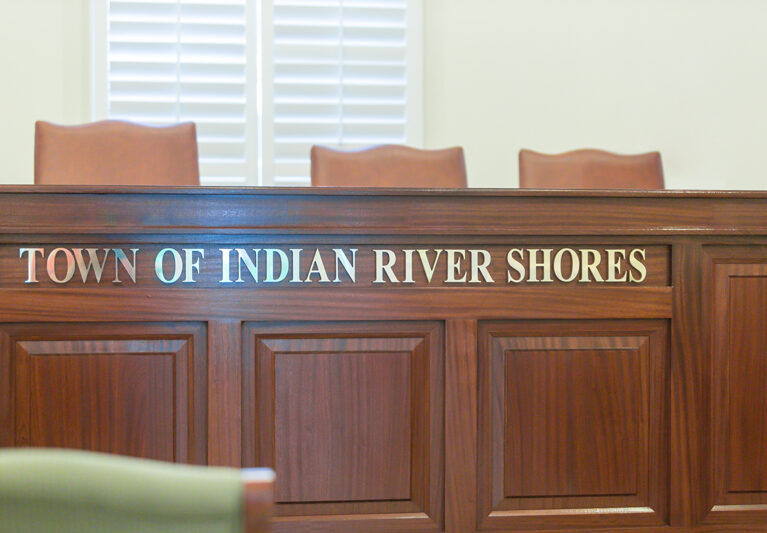
The Town of Indian River Shores has asked the Florida Supreme Court to consider its 2020 breach of contract lawsuit appeal, and to uphold the validity of the town’s utility franchise agreement with the City of Vero Beach.
Vero officials have said the costly legal dispute over utility rates is over, but Shores officials say they are in it for the long haul, because if the Florida trial and appeals courts won’t honor a valid franchise agreement voted on and executed by both municipalities’ duly elected councilmembers, state regulators need to step in to protect consumers.
Shores Mayor Brian Foley acknowledged that a clear answer likely won’t come before Indian River Shores needs to notify Vero in April whether the town intends to remain on Vero’s water-sewer system, or whether the barrier island community will obtain utility service elsewhere starting in October 2027.
“There’s no specific time frame but it could be up to a year. It all really depends on the court’s docket, and the element of interest in it,” said Foley, an attorney, pointing out that the Florida Supreme Court has the prerogative to hear or not hear the case. “In an ideal world, of course, we’d like to get an answer before the revised deadline to terminate or renegotiate, but I’m fully prepared for that not to happen.”
Foley and the town’s legal team are hoping to get on the court’s docket under the guise of “discretionary jurisdiction,” arguing that the 4th District Court of Appeals ruling contradicts a 1955 decision of the Florida Supreme Court in which the justices upheld the terms of a utility franchise agreement between the City of Gainesville and the University of Florida. That ruling has yet to be overturned in nearly 70 years.
In the early 20th century, the City of Gainesville promised to give UF free water service to entice UF to locate its main campus in Gainesville. Despite the exponential growth of the college over five decades and the financial burden that providing free water service to the university placed on the City of Gainesville and on Gainesville’s other utility customers, the appeals court told Gainesville it must uphold its promise.
The bargain was struck so Gainesville could gain a competitive advantage over other cities who were also courting UF to locate in their city or county. In 2012, Vero Beach promised in its franchise agreement to match Indian River County Utilities rates for Indian River Shores customers to knock Indian River County out of the competition for the Shores’ utility business.
Attorney Kevin Cox from Holland and Knight’s utilities division wrote in the filing, “The decision is within the Florida Supreme Court’s discretionary jurisdiction because it expressly and directly conflicts with a decision of another district court of appeal or the Florida Supreme Court on the same question of law, including but not limited to City of Gainesville v. Board of Control, 81 So. 2d 514 (Fla. 1955).
Vero won the circuit court case and the appeal, but Foley said the town believes both of those rulings are “squarely at odds with the Gainesville case.”
“We think that this needs to be addressed and there’s also a very important public policy component to this which is since unregulated utilities are permitted in Florida, the only protection the purchasers have is a franchise agreement right? If the franchise agreements are not going to be worth the paper they’re written on, according to some lower courts like we encountered, that’s an issue that really needs to be taken up – if not by the legislature, by the Supreme Court.
“I wouldn’t foreclose putting this on the governor’s radar screen particularly since there’s now a legal challenge to the Gainesville Regional Utilities Commission,” Foley said, referring to a move by Gov. Ron DeSantis to curtail that municipal utility’s fiscal practices, specifically the massive transfers from the utility into the municipal general fund.
“That was supposed to be the solution you know for the electrical issue. Perhaps there needs to be some good old-fashioned legislation that actually addresses and solves the problem,” Foley said. “It’s a lot more palatable you know for a public to pay and absorb rate increases when they have at least a regulatory body charged with the expertise of saying this is reasonable and this isn’t.”
The City of Vero Beach does not need to justify its rates before the Florida Public Service Commission like a private investor-owned utility would.
“Once you remove the fiction – and I’m gonna say it’s now a fiction – that franchise agreements are there to protect municipalities that purchase utility services from another municipality, you’re left with no alternative other than that they be regulated,” Foley said.
“It’s that simple. If you take the franchise agreement away as a protection, you’re gonna have to find another way to protect the ratepayers.”
After winning the circuit court case, the Vero Beach City Council approved and imposed the first of a series of double-digit rate increases on all of its customers, including those in Indian River Shores, in January, showing that the Shores’ signed franchise agreement was pretty worthless.
“But it also has to have a regulator with fiscal teeth that can prevent the municipality that has the enterprise utility from the temptation of using it as a piggy bank to fund other operations due to lack of discipline and efficiency in other corners. It’s just too easy to start pumping millions of dollars from one side of the ledger to the other side of the ledger without any kind of accountability,” Foley said.



